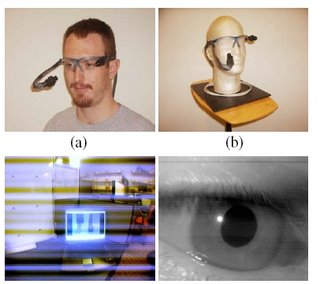DIY Design Corner: Open-Source Eyetracking

Iowa State University's Human and Computer Vision Lab has released open-source software and simple hardware design instructions for building your own eyetracking device. These tools are used to analyze useability and design strategies for websites, software, and web-based applications as well as training simulators and other cognitive studies. One leading professional purveyor of these services, Eyetracking, Inc., rose out of a twenty-year, federally-funded grant project at San Diego State University, and has surrounded itself with patented techniques - GazeTrace™, GazeSpot™, GazeStat™, GazeTransition™; another, Eyetools, which conducts the high-profile Poynter news-analysis tests I blogged about in June ("Eyetrack III's Implications for Educational Multimedia"), appear to have designed the "heatmap" analysis that makes it easy for anyone to interpret collected data. But the core technology is open-source, and Iowa State researchers and others have worked to make their work available and accessible to others free of charge.
Other institutions, including the Rochester Institute of Technology and Kansas State University, build their own headmounted systems, sometimes blending them with hardware from Applied Science Laboratories, and pair them with applications written for the "robust" MATLAB software for Mac, PC or Linux. Software is typically free, like that offered by Iowa State or another free program by researchers at Northwestern, but a single commercial license for MATLAB will run you $1,900. Iowa State even has a solution for that: a "lite" version of their open-source software that will run off of a Linux box. Iowa State even has a wiki on the subject, to which anyone can contribute.
If you're not up to the challenge, Eyetools lists their prices on their website and discusses their findings in a research blog - practices Eyetracker, Inc. declines to emulate. At $125 per person per page, a simple study from Eyetools could be pretty cheap for a up-and-coming Web 2.0 application. As an added bonus, Eyetools makes it easy for graphic designers to resell their services to clients.

No comments:
Post a Comment